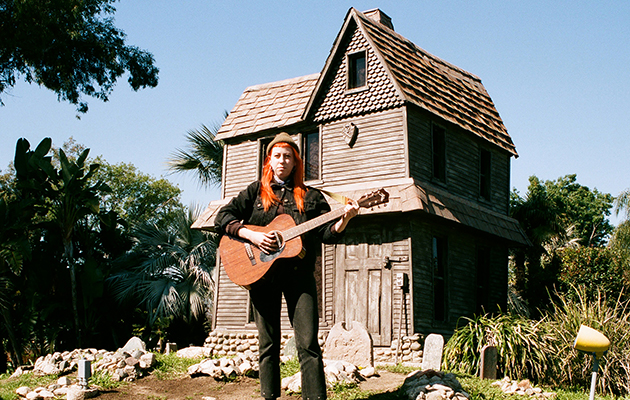Trust me,” Shannon Lay sings on “Sunday Sundown”, a soft yet forceful standout on her new album, August. The Los Angeles singer-songwriter repeats those two simple words one more time, prompting you to lean in and listen closely to what she’s about to tell you: “Love is hard to find, with the shadows of your mind tellin’ you otherwise.” That’s a hard sentiment, but it derives so much of its power from that insistent set-up, as though she’s reached through the speaker and put a sympathetic hand on your shoulder. Lay uses similar techniques throughout August, peppering her songs with entreaties meant to make you pay special attention. On “Nowhere”, she turns syllables into sharp staccato jabs and sounds like she’s trying to call from across a crowded room. On the intense “Unconditional”, she cautions you, just on the cusp of outraged: “They’ll take all they want and they’ll give nothin’ back to you.” Then she punctuates it with an exhaled, not-quite-defeated, “It’s true.”
That trick makes Lay’s quiet songs sound loud and disruptive. Her melodies are pretty, her singing often beautiful, but August is never merely pretty and beautiful. Rather than inert or passive, her songs are active and lively, even a little prickly, from her deft finger-picking to her assertive vocal phrasing. The album strives to connect artist with audience, to speak directly to you, the individual listener. If she’s a confessional singer-songwriter, then she’s writing your confessions as well as her own. That makes her music both bracing and enticing, as she invites you into her world but doesn’t let you get too comfortable.
Fittingly, the title comes from an event that made Lay very uncomfortable. In August 2017, Lay quit her day job at a vintage store in Los Angeles called Squaresville and devoted herself fully to music. The experience was both fretful (would she be able to pay rent?) and freeing. Almost immediately she booked a tour opening for Kevin Morby, who thought so highly of her that he launched a special label imprint to release her album, Living Water, later that year. Since then she’s barely rested, balancing the demands of a solo career with her garage-punk band Feels and a touring gig in Ty Segall’s Freedom Band.
Order the latest issue of Uncut online and have it sent to your home!
Lay recorded August with Segall at his LA home studio, emphasizing voice and guitar. She’s a precise instrumentalist who favours a finger-picked style that recalls Nick Drake or Paul Simon. You can hear her hands running along on the fretboard on “November”, which reinforces the song’s autumnal intimacy as well as its impression she’s aiming the song right at you. And her voice is gentle but steady, a bit like Sibylle Baier on “Shuffling Stoned”, insinuating the melody more than stating it outright. But there is something insistent in Lay’s phrasing, especially on “Past Time”, and her stoicism only makes her disdain for a self-involved someone so much more withering: “Tell me again about the things your mother made and how no-one did it better and no-one ever will,” she sings, her voice like an eye roll. “How I do love this time.”
To this foundation of voice and guitar she adds judicious flourishes that accentuate the songs without weighing them down. There’s emphatic percussion on “Wild”, droning violin and a locomotive snare on the title track, and a ramshackle indie-rock band on “Nowhere”, complete with keyboard solo and handclap rhythms. Mikal Cronin adds a fluttering sax to the stark opener “Death Up Close”, which adds breath and life to a song about their opposites. Many artists deploy that instrument for its dated associations, but there’s nothing ironic about Lay’s harrowing brush with mortality. Rather, it’s almost celebratory, as though our stories are more dramatic for having endings. When she sings three simple words at the end of the song – “I love you” – they have the weight of radical sincerity.
Perhaps Lay’s riskiest songwriting gambit is “The Dream”, on which she switches from acoustic to electric guitar, its notes sustained instead of short, each flowing into the other to create a cloudy, floating sensation. “It seems to me all a dream,” she sings, then repeats the phrase like a half-remembered mantra. Those are, in fact, the only words to the song, but Lay explores every fluttering facet of those syllables, as though trying to remember something her subconscious dredged up the night before. It’s a remarkable moment that closes an album that takes nothing for granted, that doesn’t consider your attention a gift, that wants to impart something profound to you. Trust her.
Subscribe to Uncut and make huge savings on the cover price – find out by clicking here!



